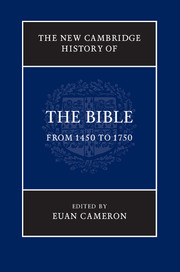Book contents
- Frontmatter
- Contents
- List of figures
- List of contributors
- Preface
- List of abbreviations
- Introduction
- PART I RETRIEVING AND EDITING THE TEXT IN EARLY MODERN EUROPE
- PART II PRODUCING AND DISSEMINATING THE BIBLE IN TRANSLATION
- 7 Publishing in print: Technology and trade
- 8 Latin Bibles in the early modern period
- 9 The Luther Bible
- 10 Bibles in the Dutch and Scandinavian vernaculars to c. 1750
- 11 German Bibles outside the Lutheran movement
- 12 Bibles in French from 1520 to 1750
- 13 English Bibles from c. 1520 to c. 1750
- 14 Bibles in Central and Eastern European vernaculars to c. 1750
- 15 Bibles in Italian and Spanish
- PART III PROCESSING THE BIBLE: COMMENTARY, CATECHESIS, LITURGY
- PART IV THE BIBLE IN THE BROADER CULTURE
- PART V BEYOND EUROPE
- Afterword
- Select bibliography
- Select Bible bibliography
- Index
14 - Bibles in Central and Eastern European vernaculars to c. 1750
from PART II - PRODUCING AND DISSEMINATING THE BIBLE IN TRANSLATION
Published online by Cambridge University Press: 05 August 2016
- Frontmatter
- Contents
- List of figures
- List of contributors
- Preface
- List of abbreviations
- Introduction
- PART I RETRIEVING AND EDITING THE TEXT IN EARLY MODERN EUROPE
- PART II PRODUCING AND DISSEMINATING THE BIBLE IN TRANSLATION
- 7 Publishing in print: Technology and trade
- 8 Latin Bibles in the early modern period
- 9 The Luther Bible
- 10 Bibles in the Dutch and Scandinavian vernaculars to c. 1750
- 11 German Bibles outside the Lutheran movement
- 12 Bibles in French from 1520 to 1750
- 13 English Bibles from c. 1520 to c. 1750
- 14 Bibles in Central and Eastern European vernaculars to c. 1750
- 15 Bibles in Italian and Spanish
- PART III PROCESSING THE BIBLE: COMMENTARY, CATECHESIS, LITURGY
- PART IV THE BIBLE IN THE BROADER CULTURE
- PART V BEYOND EUROPE
- Afterword
- Select bibliography
- Select Bible bibliography
- Index
Summary
The early modern religious history of Central and Eastern Europe is notable for its diversity of churches and faiths. The region included both Latin and Orthodox Churches, and also a growing number of confessional rivals who emerged from movements of reform including Hussites, Bohemian Brethren, Lutherans, Anabaptists, Calvinists, Anti-Trinitarians and Greek Catholics. Although monarchs and rulers mostly remained faithful to either the Roman Catholic or Eastern Orthodox Churches, reformers found support among magnates and nobles, and in towns. In the Polish–Lithuanian commonwealth, in the lands of the Bohemian Crown and in the territories of the Hungarian kingdom this noble backing for movements of religious reform was largely successful in ensuring protection from any heresy prosecutions. Agreements between monarchs and their estates then offered legal rights to Protestant churches from the latter half of the sixteenth century. However, from the early decades of the seventeenth century both the Habsburgs and the kings of Poland were able to undermine these agreements and to erode the legal rights of non-Catholics. Many Protestant nobles across the region converted back to the Catholic Church, leaving non-Catholic clergy and congregations increasingly vulnerable and isolated. The revival of Catholicism across Central Europe during the seventeenth century included efforts by courts and the clergy hierarchy to reverse Protestant gains, but also extended to gaining ground among Orthodox communities by supporting the development of Greek Catholic churches.
The production of Bibles in the vernacular languages of Central and Eastern Europe during this period reflected this changing political and religious landscape, and was related to the rise and fall of Protestantism among different linguistic communities. Bibles were first printed during the late fifteenth century by those who believed that it would broaden and deepen understanding of Christian religion. The production of vernacular Bibles from the mid-sixteenth century was particularly linked to attempts to advance different reform movements. Clerics worked to provide vernacular versions of the Scriptures for their own linguistic communities, and Bibles were also produced in mission efforts to advance reform among neighbouring vernacular communities. The production and reception of vernacular Bibles was also shaped by the small number of centres of book production and by low levels of literacy.
- Type
- Chapter
- Information
- The New Cambridge History of the Bible , pp. 345 - 357Publisher: Cambridge University PressPrint publication year: 2016



